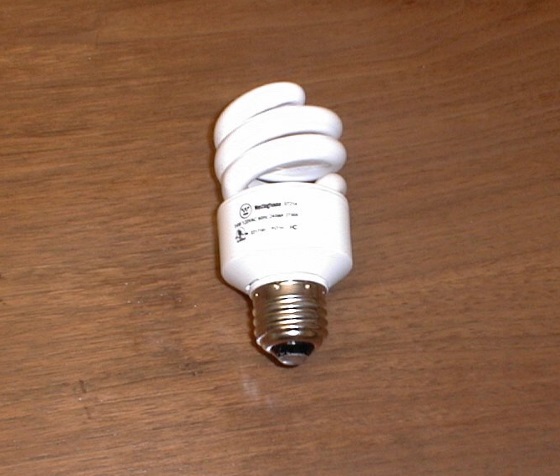Compact Fluorescent Light Bulbs

These crazy looking bulbs work and they save money. If your family leaves on lights like mine does, you will see a big difference in your electric usage should you replace lots of your ordinary bulbs with these.
DEAR TIM: I want to conserve and cut down on my electricity usage. During the winter my interior lights are on for long periods of time. I turn lights off and have started to use standard bulbs that are lower wattage. Now it is so dark and dim I feel like I live in a cave. Are those newer compact fluorescent light bulbs (CFLs) as good as advertised? Will they produce enough light? Joanne O., Wenham, MA
DEAR JOANNE: More people need to think like you do. Not only will lots of money be saved but the planet's natural resources will also be conserved for future generations. People need to be constantly reminded that Mother Nature can not create coal, oil and natural gas as fast as we use it. Much of the electricity we consume is generated using these fossil fuels.
Two things work against us during the winter months. Not only are the nights considerably longer, but most people tend to stay indoors out of the cold weather. It is not uncommon for electricity used for indoor lighting to surge 250 percent or more from what you might use in the summer months. Although it is a great idea to save energy on lighting every day, you get the best return on investment in the dead of winter.
The CFLs really save money. In almost all cases, a CFL bulb will only consume 25 percent of the electricity that is gobbled up by a wasteful standard incandescent bulb. Yet the amazing reality is that this smaller wattage CFL bulb produces the same amount of light as a traditional bulb. The color/glow is also exactly the same, so don't worry that the inside of your home is going to have the harsh look of an office building. The CFLs are designed to produce light that is ideal for the inside of the average home.
To achieve savings that you can really see on your utility bill you need to embark on a program to change as many of your traditional bulbs as quickly as possible. For example, the average living room might have two table lamps, possibly two recessed lights and maybe a ceiling fan light. If you replace all of the bulbs in this one room with CFLs, you could easily save close to $32.00 per year. If you do a quick analysis of the remaining bulbs in your home, you might discover that you can save a whopping $260.00 per year.
Another often overlooked benefit of the CFLs bulbs is that they last typically eight to ten times longer than a standard incandescent bulb. This means that year in and year out you will continue to save enormous amounts of money. In fact, some CFL bulb manufacturers guarantee their bulbs to last a minimum of seven years. Simple math shows that a CFL bulb might pay for itself in just replacement costs alone! Add in the energy savings and you can see why 65 percent of the households in Germany use CFL bulbs throughout their homes.
The CFL bulbs are available in a variety of sizes. Not only can you get ones that replace a standard light bulb, you can also get reflective bulbs that are designed to work in recessed light fixtures. Even tiny CFLs are made for candelabra fixtures. If you live in a warmer climate you can confidently use these bulbs in outdoor applications. Cold air temperatures can affect the startup of the bulbs and some CFLs do not work if the temperature drops below 20F.
When you go to buy CFL bulbs you need to pay attention to the wattage of the bulb. Keep in mind that a 15 watt CFL bulb produces the same amount of light as a 60 watt incandescent bulb. Some manufacturers have wonderful packaging that shows you exactly what type of bulb the CFL is replacing. When you get home and turn your CFLs on, they will react like you do when you first get up in the morning. It takes several seconds for them to get up to full brightness. Don't think that the bulbs are defective. Trust me, you are going to have the brightest cave on the block!
Column 393